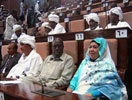
The body charged with administering South Sudan’s vote on secession or unity was finally approved yesterday in a unanimous vote by the Sudanese parliament after months of disagreement and delays. The formation of the Referendum Commission marks a critical first step in the few months left before the referendum in January, one that Sudanese and international actors alike have been anxiously awaiting since the passage of the Referendum Act late last year.
The commission, tasked with the mandate to “monitor and ensure accuracy, legitimacy, and transparency” of the referendum, is headed by Mohammed Ibrahim Khalil, who previously served as foreign minister and head of parliament under former Prime Minister Sadiq al-Mahdi. The international experts on the commission, as mandated by the Referendum Act, have not been announced.
Already, questions have arisen about whether Khalil is a good choice for the highly political post. One commentator, Sudanese journalist Magdi Elgizouli, said in an email to Enough that despite the chairman’s prestige, his ability to be an independent voice may be limited:
I seriously doubt if a man of his age and political culture can withstand the raging politics that surround the referendum and hold firm ground. The Commission he chairs is largely dependent on the good spirit of the larger state machinery, one that is in general biased when considering the possibility of secession of the South. Despite his probable goodwill I do not think he is capable of pulling out a free and fair referendum. Foremost, the referendum is a political exercise rather than an exercise of the vote.
The past week also saw progress on post-referendum negotiations, with the NCP and its southern counterpart SPLM agreeing on the structure of talks going forward. Negotiations will be led by a Joint Negotiation Team, composed of six members from each party, and supported by four working groups that tackle the pressing issues in the case of divorce: 1. citizenship, 2. security, 3. financial, economic, and natural resources, and 4. international treaties and legal issues. The Joint Negotiation Team will address issues not covered within these four groups.
Importantly, the agreement also effectively spelled out which international actors would take the lead – but less clearly how – in supporting Sudanese parties at each level of negotiations. The Thabo Mbeki-led African Union High Level Implementation Panel was named as the main international “facilitator,” with support from IGAD (an east African regional body that was the lead international player during the CPA process), the IGAD partners forum (which includes 20 countries and international organizations combined), and the U.N.
Though crucial, these steps mark only the beginning of two complicated processes, both coming quite late in the game. Pre-referendum logistics such as voter registration, civic education campaigns, and selection of registration and polling sites have yet to occur, and questions such as who exactly is eligible to vote will no doubt be controversial. And needless to say, agreeing on structures and principles is much simpler than compromising on post-referendum issues such as how much oil revenue the North will receive in exchange for the use of its pipeline, or how to define who is a Southerner or a Northerner.
Photo: Sudanese parliament (Sudan Tribune)

